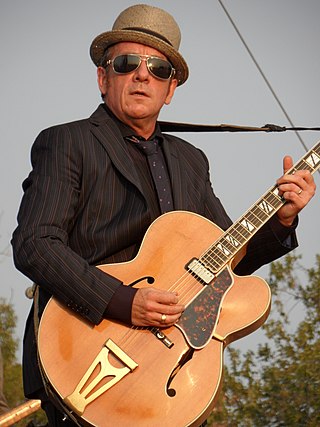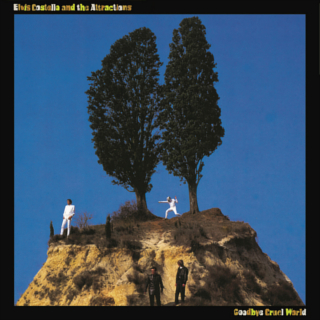
Declan Patrick MacManus, known professionally as Elvis Costello, is an English singer, songwriter, record producer, author and television presenter. Per Rolling Stone, Costello "reinvigorated the literate, lyrical traditions of Bob Dylan and Van Morrison with the raw energy and sass that were principal ethics of punk", noting the "construction of his songs, which set densely layered wordplay in an ever-expanding repertoire of styles." His first album, My Aim Is True (1977), is widely regarded as one of the best debuts in popular music history. It spawned no hit singles, but contains some of Costello's best-known songs, including the ballad "Alison". Costello's next two albums, This Year's Model (1978) and Armed Forces (1979), recorded with his backing band the Attractions, helped define the new wave genre. From late 1977 through early 1980, each of the eight singles he released reached the UK Top 30. His biggest hit single, "Oliver's Army" (1979) sold more than 400,000 copies in Britain. He has had more modest commercial success in the US, but has earned much critical praise. From 1977 through the early 2000s, Costello's albums regularly ranked high on the Village Voice Pazz & Jop critics' poll, with This Year's Model and Imperial Bedroom (1982) voted the best album of their respective years. His biggest US hit single, "Veronica" (1989), reached number 19 on the Billboard Hot 100.

When I Was Cruel is the 19th studio album by English singer-songwriter Elvis Costello, released in the US by Island Records on 23 April 2002. Although formally credited as solo Costello album, this was the first album to feature his new band, the Imposters. Their only difference from his previous band, the Attractions, was the replacement of bassist Bruce Thomas, with whom Costello had feuded, with Davey Faragher.

"Oliver's Army" is a song written by Elvis Costello and performed by Costello and the Attractions, from the former's third studio album Armed Forces (1979). The song is a new wave track that was lyrically inspired by the Troubles in Northern Ireland and includes lyrics critical of the socio-economic components of war. Costello had travelled to Northern Ireland and was influenced by sights of British soldiers patrolling Belfast. Musically, the song features a glossy production and a keyboard performance inspired by ABBA, creating a juxtaposition between the lyrics and music that both critics and Costello have pointed out.

Steve Nieve is an English musician and composer. In a career spanning more than 40 years, Nieve has been a member of Elvis Costello's backing bands the Attractions and the Imposters, as well as Madness. He has also experienced success as a prolific session musician, featured on a wide array of other artists' recordings.

Goodbye Cruel World is the ninth studio album by the English singer-songwriter Elvis Costello, and his eighth with the Attractions—keyboardist Steve Nieve, bassist Bruce Thomas and drummer Pete Thomas. It was released on 18 June 1984 through F-Beat Records in the United Kingdom and Columbia Records in the United States. Produced by Clive Langer and Alan Winstanley, who returned from 1983's Punch the Clock, the album was recorded at London's Sarm West Studios in March 1984 during a period of turmoil for the artist. The problematic sessions included disagreements between Costello and the producers over the album's direction and high tensions amongst the Attractions.

"Alison" is a song written by and first recorded by Elvis Costello in 1977 for his debut album My Aim Is True on Stiff Records. Costello claimed the song was written as an ode to a woman he saw working at a supermarket, though he has remained vague on the meaning. Though Costello's single never charted, it has become one of his most famous songs.

The discography of the English singer-songwriter Elvis Costello includes 33 studio albums, 6 live albums, 17 compilation albums, 6 tribute albums, 2 extended plays, 62 singles and 4 box sets. This page distinguishes between United States and United Kingdom release dates and record labels. Of note are the reissue series, Costello's back catalogue having undergone reissue three times by three different companies.
"Shipbuilding" is a song with lyrics by Elvis Costello and music by Clive Langer. Written during the Falklands War of 1982, Costello's lyrics highlight the irony of the war bringing back prosperity to the traditional shipbuilding areas of Clydeside, Merseyside, North East England and Belfast to build new ships to replace those being sunk in the war, whilst also sending off the sons of these areas to fight and, potentially, lose their lives in those same ships. According to Robert Sandall, the best version of the song is the one recorded and released as a single by English singer-songwriter Robert Wyatt in August 1982 a few months after the Falklands War, although it was not a hit until it was re-released eight months later on the first anniversary of the conflict.

The Best of Elvis Costello and the Attractions is a compilation album by English musician Elvis Costello and his backing band the Attractions, released in 1985. It was the first of what would be many career-spanning compilation albums of previously released material for Costello.

"Accidents Will Happen" is a song written by Elvis Costello and performed by Elvis Costello and the Attractions. It first appeared on the 1979 album Armed Forces. Costello wrote the song about his many infidelities during this period of his life, including an encounter Costello had with a taxi driver in Tucson, Arizona. The song originally featured a piano-centered arrangement and was inspired by songs such as "Anyone Who Had a Heart" and "Walk Away Renée".

"I Might Be Crying" is a song by British singer-songwriter Tanita Tikaram, which was released in 1995 as the lead single from her fifth studio album Lovers in the City.

"Watching the Detectives" is a 1977 single by English singer-songwriter Elvis Costello. Inspired by the Clash and Bernard Herrmann, the song features a reggae beat and cynical lyrics.

"Girls Talk" is a new wave song written by Elvis Costello and first recorded by Dave Edmunds in 1978. Costello gave an early version of the song to Edmunds, who reworked the song and released it on his album Repeat When Necessary. Edmunds' version peaked at number four on the UK Singles Chart and number 12 in Ireland, becoming one of Edmunds' most successful career singles.

"(I Don't Want to Go to) Chelsea" is a song written by new wave musician Elvis Costello and recorded by Costello with his backing band the Attractions. The song appeared on Costello's 1978 second album, This Year's Model. Written by Costello while working as a computer programmer, the song was lyrically inspired by films Costello had been watching as well as childhood trips to Chelsea. Musically the song featured influence from bands such as the Who and the Kinks and is notable for Bruce Thomas's prominent bassline.

"High Fidelity" is a song written and performed by new wave musician Elvis Costello on his 1980 album, Get Happy!! Written about an adulterous couple where one member still hopes for reconciliation, "High Fidelity" reflected the personal struggles that Costello had been suffering at the time as a result of increased fame and controversy. Musically, the song was influenced by Motown and was initially performed in a slower style inspired by David Bowie's Station to Station.

"Clubland" is a song written by new wave musician Elvis Costello and performed by Costello and the Attractions on their 1981 album, Trust. Written in 1980, the song was performed live in festivals before the album's release. The lyrics, inspired by the band's most recent tour, describe life in nightclubs, while the music includes inspiration from The Police.

"The Only Flame in Town" is a song written by new wave musician Elvis Costello and recorded by Costello with his backing band the Attractions. The song appeared on Costello's 1984 album, Goodbye Cruel World. Originally written in the style of a classic torch song, "The Only Flame in Town" was reworked by producers Clive Langer and Alan Winstanley in a more pop-friendly style. This final version features Daryl Hall of Hall & Oates on backing vocals.

"Blue Chair" is a song written by new wave musician Elvis Costello and recorded by Costello with his backing band the Attractions. The song first appeared on Costello's 1986 album, Blood & Chocolate. First intended for Costello's previous album King of America, the song was scrapped during that session and reworked with the Attractions around Steve Nieve's piano part.

"London's Brilliant Parade" is a song written and performed by new wave musician Elvis Costello that was first released on his 1994 album Brutal Youth. Written as a reflection on Costello's birth city of London, the song features lyrics based on his recollection of London during the 1960s as well as music inspired by the Kinks. The song was one of those on the album that featured Costello performing with his longtime backing band the Attractions, who reunited during the course of the album's recording. As such, Costello singled out the song as an instance of the band's ability to perform sophisticatedly.
"The Other End (Of the Telescope)" is a song by American band 'Til Tuesday, which was released in 1988 on their third and final studio album Everything's Different Now. The song was written by Aimee Mann and Elvis Costello. Costello recorded his own version of the song for his 1996 album All This Useless Beauty.


















